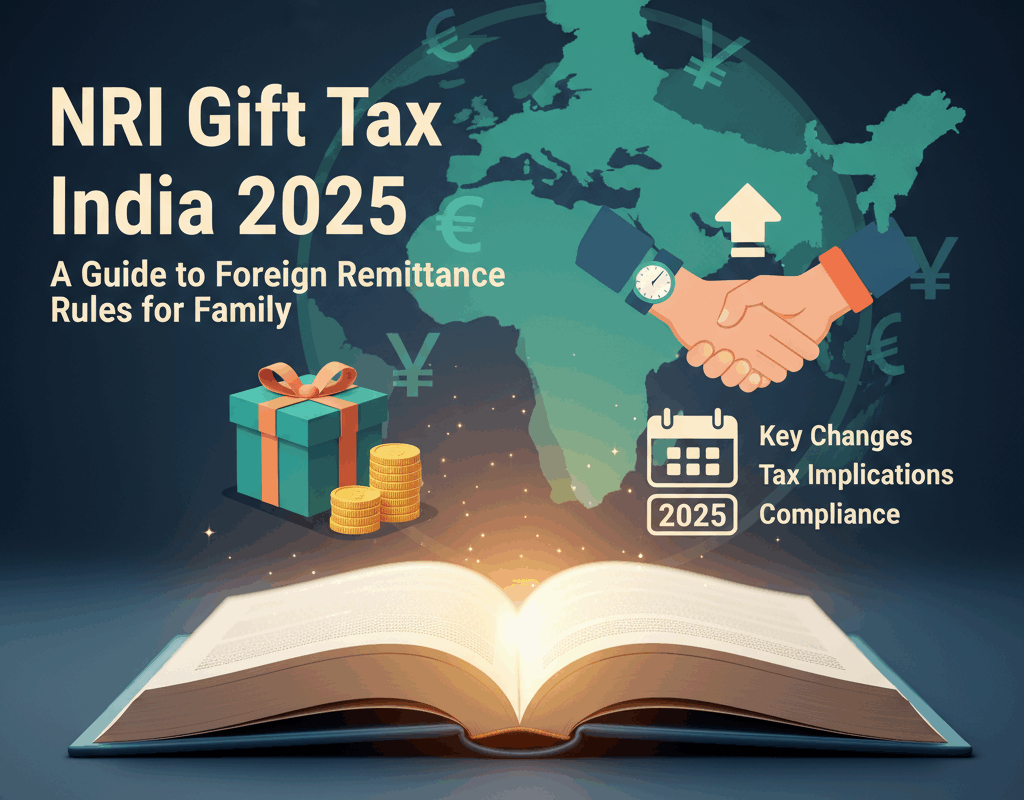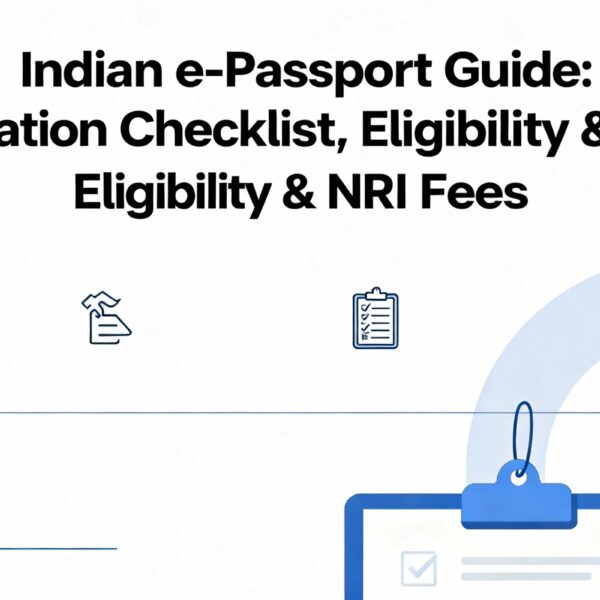Receiving money from relatives abroad is a common practice, but the tax implications of foreign remittance in India can be complex. This comprehensive guide for 2025 breaks down the essential laws governing gifts from NRIs. We will explore the critical differences between a tax-exempt gift from a ‘relative’ versus a taxable transfer from a friend, the strict ₹50,000 threshold under the Income Tax Act, and the mandatory FEMA & RBI compliance for every transaction. Whether you’re receiving funds for family maintenance, marriage, or as a loan, understanding these rules is key to ensuring your foreign remittance is fully compliant and tax-efficient.
Navigating Foreign Remittances from Relatives
A Definitive Legal Guide for Residents of India.
Updated for Financial Year 2025-26.
Executive Summary
The legal framework for receiving money from Non-Resident Indian (NRI) relatives is straightforward: gifts from 'relatives' (as defined by the Income Tax Act, 1961) are tax-exempt, regardless of the amount. However, gifts from anyone else—like friends or cousins—are taxed if the total exceeds ₹50,000 in a financial year. All transactions must follow FEMA and RBI rules, using official banking channels. Proving a transfer is a genuine gift is the recipient's responsibility, making a registered Gift Deed essential. For transparency, even tax-free gifts should be reported in your Income Tax Return (ITR).
The Dual-Law Framework
Every foreign remittance is governed by two independent sets of laws. Compliance with one does not guarantee compliance with the other.
The "Relative" Exemption: A Deep Dive
The most powerful provision in gift tax law is the complete exemption for gifts from a 'relative'. The Income Tax Act provides a precise, non-negotiable list of who qualifies. It's crucial to understand that common terms like "cousin" or "nephew" are not on this list.
Filter the Relatives List
Use the buttons below to interactively filter the table and see who qualifies for tax-exempt gifts.
| Relationship to Recipient | Common Terminology | Tax-Exempt? |
|---|---|---|
| Spouse | Husband / Wife | Yes |
| Brother / Sister | Bhai / Behen | Yes |
| Any Lineal Ascendant (Parents, Grandparents) | Father, Mother, etc. | Yes |
| Any Lineal Descendant (Children, Grandchildren) | Son, Daughter, etc. | Yes |
| Brother or Sister of the Spouse | Brother-in-law / Sister-in-law | Yes |
| Any Lineal Ascendant of the Spouse | Father-in-law, Mother-in-law | Yes |
| Brother or Sister of either Parent | Uncle / Aunt (Chacha, Bua, Mama, Mausi) | Yes |
| Spouse of any person mentioned above | Bhabhi, Jija, Chachi, Phupha, etc. | Yes |
| Cousin (Child of Parental Sibling) | Cousin | No |
| Nephew / Niece (Child of Sibling) | Nephew / Niece | No |
Gifts from Non-Relatives: The ₹50,000 Rule
When you receive money from an NRI who is not a 'relative' (e.g., a friend, cousin, or nephew), a strict monetary threshold applies. If the total of all such gifts in a financial year exceeds ₹50,000, the *entire amount* becomes taxable. It's not just the amount above the limit, but the whole sum.
Interactive Tax Threshold Calculator
Drag the slider to see how the tax implication changes as the gift amount from non-relatives crosses the ₹50,000 threshold.
Other Tax-Exempt Gifts: Special Scenarios
Beyond the 'relative' definition, the Income Tax Act specifies other situations where gifts are completely tax-free, irrespective of the amount or the sender's relationship to you.
💍 On the Occasion of Marriage
Any sum of money or property received on the occasion of your marriage is fully exempt from tax. This applies to gifts from anyone—friends, distant relatives, or employers.
📜 By Will or Inheritance
Money or assets received through a will or as part of an inheritance are not considered income and are therefore not taxable.
Foreign Exchange Rules: FEMA & RBI
Taxability is only half the story. The transfer itself must comply with the Foreign Exchange Management Act (FEMA), regulated by the RBI. This framework ensures that all cross-border transactions are transparent and legitimate.
Sender's View: Liberalised Remittance Scheme (LRS)
For the NRI sender, these gifts are typically remitted under the RBI's LRS, which allows resident individuals to remit up to USD 250,000 per financial year for permitted transactions, including gifts.
Recipient's Proof: FIRC
Upon receiving the funds, you can request a Foreign Inward Remittance Certificate (FIRC) from your bank. This document is official proof that the funds originated from abroad through legal channels.
The Remittance Flow
Initiation by NRI
The NRI relative sends money from their NRE/NRO account through an authorized bank via SWIFT or other legal channels.
Processing by Bank
The recipient's bank in India (an Authorized Dealer) receives the funds and reports it to the RBI.
Purpose Code Declaration
The bank assigns a purpose code, like P1301 (family maintenance) or P1302 (personal gifts), for regulatory clarity.
Alternative Structures: Gift vs. Loan
Structuring a fund transfer as a loan instead of a gift has vastly different legal and tax consequences. This is a critical strategic choice, especially when the sender is not a 'relative'.
🎁 Gift
- Taxability: Taxable for recipient if from a non-relative and exceeds ₹50,000.
- Repayment: No obligation to repay.
- Documentation: Requires a registered Gift Deed.
- Best For: Genuine financial support from defined 'relatives'.
💼 Loan
- Taxability: Principal is not taxable for the recipient. It's a capital receipt.
- Repayment: Legal obligation to repay as per agreement.
- Documentation: Requires a formal Loan Agreement.
- FEMA Rules: Must be interest-free with a minimum 1-year tenure.
- Best For: Receiving funds from non-relatives to avoid gift tax.
Gifts to a Hindu Undivided Family (HUF)
The rules for an HUF receiving gifts are distinct. An HUF is a separate legal entity for tax purposes.
- Gifts from Members: Any sum of money received by the HUF from any of its members is fully exempt from tax.
- Gifts from Non-Members: If an HUF receives a gift from a non-member (e.g., a friend of the Karta), the standard ₹50,000 threshold applies. If the gift exceeds this limit, the entire amount is taxed as the HUF's income.
Actionable Compliance Checklist
To ensure a smooth, tax-compliant transaction, follow these critical steps. The burden of proof always lies with you, the recipient.
Verify the Relationship First
Before the transfer, use our interactive table to confirm the sender qualifies as a 'relative' under the Income Tax Act.
Execute a Registered Gift Deed
This is your most crucial piece of evidence. Get it drafted, signed by a donor, donee, and two witnesses, and register it.
Use Authorized Banking Channels
Ensure the transfer is a direct bank-to-bank wire. Avoid informal methods like Hawala at all costs.
Keep Meticulous Records
Maintain a file with the Gift Deed, Foreign Inward Remittance Certificate (FIRC) from your bank, and bank statements of both parties.
Disclose in Your ITR
Report taxable gifts under "Income from Other Sources". Report exempt gifts in "Schedule EI (Exempt Income)" for full transparency.
The Gift Deed: Your Legal Armor
While not legally mandatory for movable gifts like money, a Gift Deed is the single most important document to prove the legitimacy of the transfer to tax authorities. It transforms an ambiguous bank credit into a legally defined, non-taxable event.
Essential Clauses in a Gift Deed
- ✓Donor & Donee Details: Full names, addresses, and relationship.
- ✓Consideration Clause: A clear statement that the gift is made out of "natural love and affection" and without any monetary consideration.
- ✓Gift Details: The exact amount of money being gifted.
- ✓Voluntary Transfer: A declaration that the donor is making the gift voluntarily and is of sound mind.
- ✓Signatures: Signed by the donor, the donee (accepting the gift), and attested by two witnesses.
Pro Tip: Stamping and registering the Gift Deed with the sub-registrar's office adds a powerful layer of legal authenticity.
ITR Filing: Reporting with Clarity
Properly reporting remittances in your Income Tax Return (ITR) is crucial for maintaining transparency and avoiding future scrutiny. Here’s how to do it correctly:
For Exempt Gifts
(From relatives, for marriage, or under the ₹50k limit)
- Where to Report: In 'Schedule EI' (Exempt Income) of your ITR form.
- Why Report: While not taxable, reporting these gifts explains the source of funds and pre-empts questions from the tax department about a sudden increase in your bank balance.
For Taxable Gifts
(From non-relatives, exceeding ₹50,000 in total)
- Where to Report: In 'Schedule OS' (Income from Other Sources). The entire amount is reported here.
- Tax Calculation: The amount is added to your total income and taxed at your applicable slab rate.
Frequently Asked Questions (FAQ)
My cousin from the USA wants to send me ₹2 lakhs. Is it tax-free?
No. A cousin is not defined as a 'relative' under the Income Tax Act. Since the amount (₹2,00,000) is greater than ₹50,000, the entire sum will be taxable as 'Income from Other Sources'.
What if I receive small gifts from three different friends, totaling ₹60,000?
The ₹50,000 limit applies to the *aggregate* amount received from all non-relatives in a financial year. Since the total (₹60,000) exceeds the threshold, the entire ₹60,000 is taxable.
Is a Gift Deed legally required for a bank transfer?
Legally, it's not mandatory for a movable gift like money. However, from a tax perspective, it is extremely advisable. It is your primary evidence to prove to the Income Tax Department that the money was a genuine gift and not undisclosed income.
How long should I keep the records for a foreign remittance?
You should maintain all records (Gift Deed, bank statements, FIRC, copies of communication) for at least 8 years from the end of the financial year in which you received the gift. This covers the time limit for the tax department to reopen assessments.










